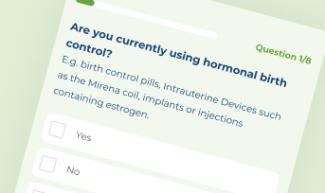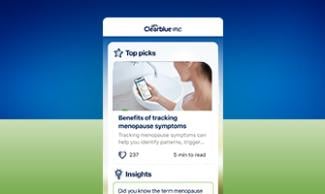5 myths and facts about perimenopause

“Perimenopause” is one of those words you’ll swear you’ve never heard before … until you suddenly start hearing it all the time. Maybe it’s because you’re getting older. Maybe it’s because more people are talking about women’s reproductive health, including menopause (which is great!). Or maybe it’s because more people are waiting until they’re older to get pregnant. But whether or not you’re familiar with the term, eventually you will be — perimenopause is something most women experience.
What is perimenopause?
Menopause is defined by the absence of menstrual periods for one year.1,2 According to the American College of Obstetricians and Gynecologists (ACOG), U.S. women, on average, experience their last menstrual period at age 51.3 The years leading up to menopause are called perimenopause, which means “around menopause.” Common signs of perimenopause include changes in your menstrual cycle, such as the length of your periods and how much you bleed. (That said, contact your ob-gyn anytime you experience abnormal bleeding, as it can be a sign of other health issues.)
Perimenopause or pregnancy?
Some women might wonder whether they’re experiencing pregnancy symptoms or perimenopause symptoms. While symptoms may not be present at all, signs of perimenopause can include hot flashes, night sweats, fatigue, sleep disturbance, headaches, incontinence, mood changes, vaginal issues (such as dryness and painful sex), bloating, cramping, urinary tract changes and weight gain.1,4 Many of these symptoms are similar to common pregnancy symptoms. But you might experience some symptoms in pregnancy that you typically don’t experience in perimenopause. These include food sensitivity, sensitive and/or swollen breasts, increased urination, constipation and nausea. If you have questions and/or concerns about your symptoms, contact your ob-gyn.

Is Clearblue® Menopause Stage Indicator right for me?
Take our simple quiz to find out!
Myths and facts about perimenopause
The subject of perimenopause comes with a lot of misconceptions about age and fertility. Here we clear up some of the most common ones. In short, fertility decreases with age, but getting pregnant during perimenopause is possible.
Myth: Perimenopause doesn’t happen until you’re too old to have a baby.
Fact: Perimenopause can last anywhere from a few months to more than 10 years.2 Typically, though, perimenopause lasts four to eight years.5 While most women experience menopause around age 51, it can happen anytime between ages 40 and 58.5 Therefore, it’s quite possible to experience perimenopause when you’re still young enough to get pregnant. Most women experience perimenopause in their mid to late 40s, at a time when they’re still ovulating.3 So can you get pregnant during perimenopause? Yes!
Myth: Your chances of getting pregnant during perimenopause are so low that you don’t need to use birth control.
Fact: Although pregnancy becomes less likely as you get older, an unplanned pregnancy is still possible until you’ve gone 12 months without a period (aka menopause). In addition, the North American Menopause Society doesn’t recommend natural family planning for perimenopausal women because it can be difficult to predict when you’re ovulating when your periods are irregular.6 Your ob-gyn can recommend the best contraceptive options for you during perimenopause.
Myth: If you’re in your 40s and you haven’t gone through menopause, fertility treatments are a good backup plan if you can’t get pregnant naturally.
Fact: Fertility begins to gradually decline in your 30s, often well before perimenopause. According to the American Society for Reproductive Medicine (ASRM), most women become unable to have a successful pregnancy in their mid-40s — this includes through natural conception and with fertility treatments such as IVF.7 Both the quality and quantity of eggs gradually decline with time. ASRM notes that by age 40, a woman’s chance of getting pregnant is less than 5% per cycle, naturally or with the help of fertility treatments.7
Myth: If you have symptoms of perimenopause but want to have a baby, it’s hopeless.
Fact: If you think you’re experiencing perimenopause and want to have a baby, talk to your ob-gyn. Depending on your age, health history and a whole slew of other factors, your symptoms may not be from perimenopause at all. Studies show that 4.5% of women are unable to conceive naturally at 25 years old — and that figure jumps to 50% at 41 and 90% at 45.8 But those statistics also mean that even if you’re more than 40 years old, you can still get pregnant naturally. As long as your ovaries produce a viable egg (which is still possible while experiencing perimenopause), you can get pregnant. But as you get older, getting pregnant naturally does become more difficult.
Myth: Every woman will go through perimenopause.
Fact: If you experience induced menopause (menopause that occurs earlier than it naturally would due to the surgical removal of ovaries) or permanent damage from certain cancer treatments, you won’t experience perimenopause.5,9

Looking for insights on your health journey? Clearblue® sends you curated, science-backed articles right to your inbox.
Sources
- “The Menopause Years,” (n.d.), The American College of Obstetricians and Gynecologists, retrieved April 14, 2021, from https://www.acog.org/womens-health/faqs/the-menopause-years.
- “What Is Menopause?” (n.d.), National Institute on Aging, U.S. Department of Health & Human Services, retrieved April 14, 2021, from https://www.nia.nih.gov/health/what-menopause.
- “Perimenopausal Bleeding and Bleeding After Menopause,” (n.d.), The American College of Obstetricians and Gynecologists, retrieved April 14, 2021, from https://www.acog.org/womens-health/faqs/perimenopausal-bleeding-and-bleeding-after-menopause.
- “Menopausal Transition (Perimenopause): What Is It?” (n.d.), The American Society for Reproductive Medicine, retrieved April 15, 2021, from https://www.reproductivefacts.org/news-and-publications/patient-fact-sheets-and-booklets/documents/fact-sheets-and-info-booklets/the-menopausal-transition-perimenopause-what-is-it/.
- “Menopause 101: A primer for the perimenopausal,” (n.d.), The North American Menopause Society, retrieved April 14, 2021, from https://www.menopause.org/for-women/menopauseflashes/menopause-symptoms-and-treatments/menopause-101-a-primer-for-the-perimenopausal.
- “Contraception: You Need It Longer Than You May Think,” (n.d.), The North American Menopause Society, retrieved April 14, 2021, from http://www.menopause.org/for-women/sexual-health-menopause-online/reminders-and-resources/contraception-you-need-it-longer-than-you-may-think.
- “Age and Fertility: A Guide for Patients,” (n.d.), The American Society for Reproductive Medicine, retrieved April 14, 2021, from https://www.reproductivefacts.org/news-and-publications/patient-fact-sheets-and-booklets/documents/fact-sheets-and-info-booklets/age-and-fertility/.
- “Too old to have children? Lessons from natural fertility populations,” Eijkemans, Marinus J. C. et al., Human Reproduction (2014). 29(6), 1304-12. https://pubmed.ncbi.nlm.nih.gov/24676403/.
- “Menopause Glossary,” (n.d.), The North American Menopause Society, retrieved April 15, 2021, from http://www.menopause.org/for-women/menopause-glossary#P.

Know more about the menopause journey
Download the Menopause Stage - Clearblue® me app to access relevant educational content, track your symptoms & periods

Can I get pregnant if I'm over 35?
If you’re over 35 you may need a little more patience and greater understanding about your fertility window to help you have a baby naturally.




